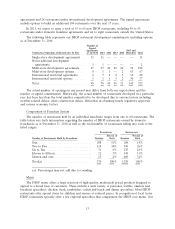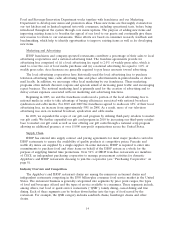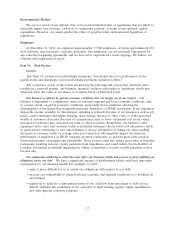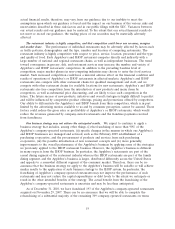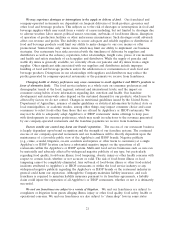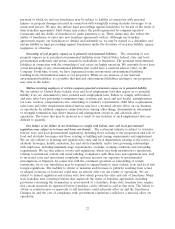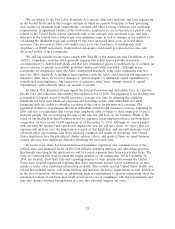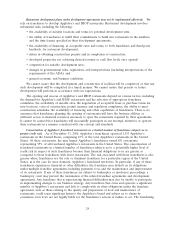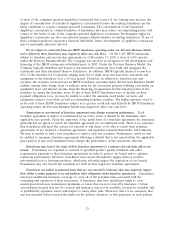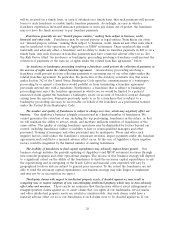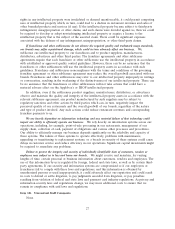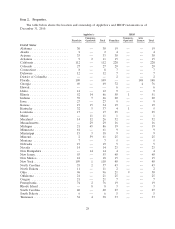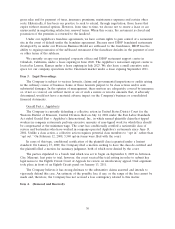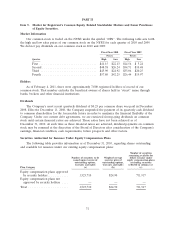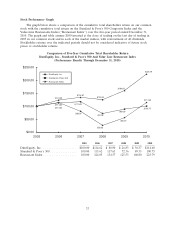IHOP 2010 Annual Report Download - page 39
Download and view the complete annual report
Please find page 39 of the 2010 IHOP annual report below. You can navigate through the pages in the report by either clicking on the pages listed below, or by using the keyword search tool below to find specific information within the annual report.We are subject to the Fair Labor Standards Act, various other laws and state and local regulations
in the United States and in the foreign countries in which we operate from time to time, governing
such matters as minimum-wage requirements, overtime and other working conditions and citizenship
requirements. A significant number of the food-service employees in our restaurants are paid at rates
related to the United States federal minimum wage or the relevant state minimum wage, and past
increases in the United States federal and state minimum wage, as well as changes in the method of
calculating the minimum wage and crediting of tips, have increased labor costs, as would future
increases. Any increases in labor costs might cause us or our franchisees to inadequately staff
Applebee’s or IHOP restaurants. Understaffed restaurants could result in reduced gross sales and
decreased profits at such restaurants.
We and our franchisees also must comply with Title III of the Americans with Disabilities Act (the
‘‘ADA’’). Compliance with the ADA generally requires that public spaces provide reasonable
accommodation to disabled individuals and that new commercial spaces or modifications of commercial
spaces conform to specific accessibility guidelines unless materially unfeasible. Although newer
restaurants are designed to meet the ADA construction standards, some older restaurants may not
meet the ADA standards. A finding of noncompliance with the ADA could result in the imposition of
injunctive relief, fines, an award of damages to private litigants or additional capital expenditures to
remedy such noncompliance. Any imposition of injunctive relief, fines, damage awards or capital
expenditures could adversely affect our revenue or profits.
In March 2010, President Obama signed the Patient Protection and Affordable Care Act and the
Health Care and Education Affordability Reconciliation Act of 2010. The legislation is far-reaching and
is intended to expand access to health insurance coverage over time by adjusting the eligibility
thresholds for most state Medicaid programs and providing certain other individuals and small
businesses with tax credits to subsidize a portion of the cost of health insurance coverage. The
legislation includes a requirement that most individuals obtain health insurance coverage beginning in
2014 and also a requirement that certain large employers offer coverage to their employees or pay a
financial penalty. We are evaluating the impact the new law will have on our business. While as the
result of our heavily franchised business model we may have fewer employees than a less-franchised
competitor, we have nearly 18,000 employees as of December 31, 2010. Although we cannot predict
with certainty the financial and operational impacts the new law will have on us, we expect that our
expenses will increase over the long term as a result of this legislation, and any such increases could
adversely affect our business, cash flows, financial condition and results of operations. Our United
States franchisees face the potential of similar adverse effects, and many of them are small business
owners who may have significant difficulty absorbing the increased costs.
In recent years, there has been an increased legislative, regulatory and consumer focus at the
federal, state and municipal levels on the food industry including nutrition and advertising practices.
Restaurants operating in the quick-service and fast-casual segments have been a particular focus. The
State of California (the state in which the largest number of our restaurants, 340 as December 31,
2010, are located), New York City and a growing number of other jurisdictions around the United
States have adopted regulations requiring that chain restaurants include calorie information on their
menus or make other nutritional information available. The recently-enacted United States health care
reform law included nation-wide menu labeling and nutrition disclosure requirements as well. Initiatives
in the area of nutrition disclosure or advertising, such as requirements to provide information about the
nutritional content of our food, may result in increased costs of compliance with the requirements and
may also change customer buying habits in a way that adversely impacts our sales.
23


